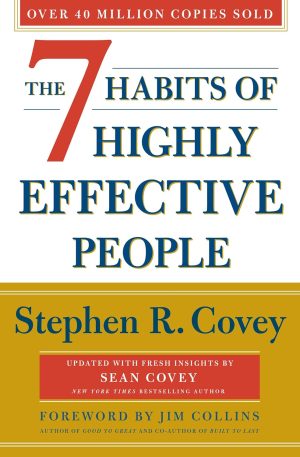Name of Book : The 7 Habits Of Highly Effective People
Name of Author : Stephen R. Covey
Stephen R. Covey’s The 7 Habits of Highly Effective People is a classic in the realm of personal development and leadership. First published in 1989, the book has stood the test of time, continuing to be a foundational text for anyone seeking long-term success, growth, and fulfillment. Covey’s principles are rooted in timeless values, and the book offers a holistic approach to personal and professional effectiveness.
Summary
At its core, The 7 Habits presents a paradigm shift—teaching readers how to move from dependence to independence and ultimately to interdependence. Covey breaks down the habits into two broad categories: Private Victory (habits 1–3) and Public Victory (habits 4–6), with habit 7 acting as the ultimate principle for continuous growth. The focus is not just on achieving goals, but on transforming the mindset and character that lead to success.
The 7 Habits
- Be Proactive: Covey emphasizes the importance of taking control of your actions, behaviors, and attitudes. Rather than reacting to circumstances, proactive people take responsibility for their choices, which empowers them to influence their outcomes.
- Begin with the End in Mind: This habit stresses the significance of having a clear vision of your life’s purpose. Covey encourages readers to create a personal mission statement that serves as a guiding framework for every decision and action.
- Put First Things First: Effective time management isn’t just about making more to-do lists—it’s about prioritizing important activities over urgent but less meaningful tasks. Covey’s framework helps you focus on what truly matters in life, rather than getting caught up in distractions.
- Think Win-Win: This habit fosters a mindset of abundance, where success is seen as a collaborative effort rather than a zero-sum game. Covey suggests that effective people work towards mutually beneficial solutions in all interactions, both personal and professional.
- Seek First to Understand, Then to Be Understood: Communication is key to strong relationships, and Covey stresses the importance of empathetic listening. To build trust and understanding, you need to listen to others before expressing your own views.
- Synergize: Covey describes synergy as the idea that the combined efforts of people working together are greater than the sum of their individual contributions. By valuing differences and leveraging them, teams can create innovative solutions that wouldn’t be possible otherwise.
- Sharpen the Saw: This final habit is about continuous self-improvement and renewal. Covey encourages readers to regularly renew their physical, mental, emotional, and spiritual well-being, as a balanced life is crucial for sustaining long-term effectiveness.
What Makes The 7 Habits Stand Out?
- Timeless Principles: The habits Covey outlines are based on principles of fairness, integrity, and respect, making the book not just a guide to effectiveness but also a guide to character development. These principles have stood the test of time and remain highly relevant in both personal and professional contexts today.
- Holistic Approach: Unlike many self-help books that focus solely on time management or personal productivity, The 7 Habits takes a holistic approach, addressing both personal growth and interpersonal effectiveness. Covey’s framework helps individuals align their character and actions, ensuring long-term success that’s rooted in integrity.
- Structured Framework: Covey’s book is well-organized, and each habit builds on the previous one. By starting with self-mastery (habits 1–3), moving on to working effectively with others (habits 4–6), and ending with continual growth and renewal (habit 7), Covey offers a clear roadmap for personal and professional development.
- Focus on Interdependence: Unlike many self-help books that focus on independence or self-sufficiency, Covey stresses the importance of interdependence—working collaboratively with others to achieve common goals. This idea is central to achieving real, lasting success in any area of life.
Strengths
- Transformational Mindset: The book doesn’t just teach you how to be more productive or organized; it shifts the way you think about personal and professional success. By focusing on character development and mindset, The 7 Habits offers long-lasting transformation, not just short-term gains.
- Actionable Advice: Covey provides practical exercises and tools to apply the habits in your life. The step-by-step process of developing these habits makes the concepts feel achievable and actionable.
- Influential: Over the decades, The 7 Habits has influenced leaders, managers, educators, and entrepreneurs across the globe. Its principles have been adopted in countless organizations and continue to shape leadership styles and cultures of success.
Weaknesses
- Length and Density: Some readers may find the book a bit dense and lengthy, particularly in the early chapters. Covey goes deep into each habit, which can feel overwhelming at times, especially if you’re looking for quick, bite-sized advice.
- Somewhat Idealistic: The habits are aspirational and can sometimes seem idealistic, especially in high-pressure environments. While the principles are universally applicable, implementing them in a world that often prioritizes urgency and short-term results may take more effort for some readers.
Conclusion
The 7 Habits of Highly Effective People is more than just a self-help book—it’s a framework for living a purposeful and effective life. Covey’s principles challenge readers to look beyond immediate gains and instead focus on cultivating the inner qualities necessary for sustained success and meaningful relationships. While it may require effort to internalize and apply these habits fully, the long-term impact is profound. The book remains a gold standard in personal development, and its relevance endures decades after its original publication.



